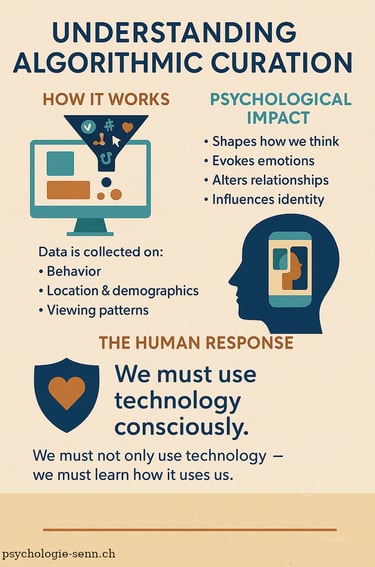What Is Algorithmic Curation?
Algorithmic curation refers to the use of automated systems (algorithms) to select, prioritize, and personalize the content we see online — across platforms like Instagram, YouTube, Facebook, TikTok, Spotify, and even Google Search.
Rather than presenting information neutrally or chronologically, these systems rely on data such as:
User behavior (clicks, views, likes, time spent)
Search history and purchase data
Location and demographic profile
Interaction patterns from similar users
This personalized curation is designed to maximize engagement, often by triggering emotional responses such as surprise, outrage, curiosity, or desire (Tufekci, 2015; Zuboff, 2019).
Psychological and Emotional Impact
Algorithmic curation reshapes how we:
Think: by reinforcing existing beliefs and limiting exposure to diverse perspectives (Pariser, 2011)
Feel: by favoring emotionally charged or polarizing content (Vosoughi et al., 2018)
Relate: by presenting curated versions of ourselves and others — tuned for visibility over vulnerability (Turkle, 2011)
Identify: by echoing back the behaviors and values we unconsciously perform online
In essence, we’re often experiencing the world through a mirror shaped by code — one that evolves based on how we behave within it.
Human Response: Conscious Use
Algorithmic systems are not inherently harmful. They can help us discover relevant content and connect with others. But when left unchecked, they narrow our worldview, fragment our attention, and can even shape our values and identity in subtle ways.
That’s why digital discernment, self-awareness, and emotional integrity are essential psychological skills in the algorithmic age (Goleman, 2013; Harris, 2020).
We must not only use technology — we must learn how it uses us.
— Adapted from Tristan Harris
📚 References
Goleman, D. (2013). Focus: The Hidden Driver of Excellence. New York: Harper.
Harris, T. (2020). The Social Dilemma [Documentary]. Exposure Labs / Netflix.
Pariser, E. (2011). The Filter Bubble: What the Internet is Hiding from You. New York: Penguin.
Turkle, S. (2011). Alone Together: Why We Expect More from Technology and Less from Each Other. New York: Basic Books.
Tufekci, Z. (2015). Algorithmic harms beyond Facebook and Google: Emergent challenges of computational agency. Colorado Technology Law Journal, 13(203).
Vosoughi, S., Roy, D., & Aral, S. (2018). The spread of true and false news online. Science, 359(6380), 1146–1151.
Zuboff, S. (2019). The Age of Surveillance Capitalism. New York: PublicAffairs.




© 2024. All rights reserved.


